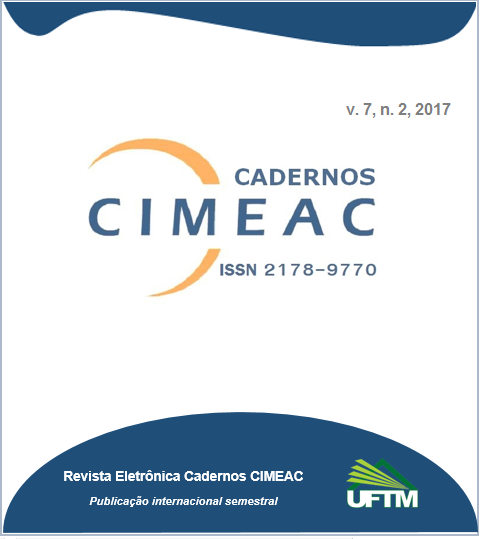Os entraves da tendência pragmática para uma educação ambiental emancipatória / The challenges of the pragmatic tendendy for emancipatory environmental education
DOI:
https://doi.org/10.18554/cimeac.v7i2.2024Resumo
Este artigo é um ensaio teórico fundamentado em autores que analisam as correntes e tendências político-pedagógicas da Educação Ambiental (EA). A discussão se apoia na ideia de crise ambiental da sociedade contemporânea e as compreensões acerca do conceito inerente ao termo “Desenvolvimento Sustentável”, característico da macrotendência pragmática. Discute-se as características de cada tendência da EA e os entraves do pragmatismo em contraposição a uma Educação Ambiental Emancipatória, tendo como referencial epistemológico e filosófico a Teoria Crítica. De forma geral, o pragmatismo se apresenta como um problema da Educação e, por consequência, da EA. A valorização do pragmatismo em detrimento do fazer permeado pelo pensamento crítico constitui um dos problemas da vertente hegemônica da EA. Embora haja um crescimento da vertente crítica da EA, a posição central dentro do campo ocupada atualmente pela tendência pragmática nos impõe uma Educação Ambiental incapaz de realizar o seu potencial emancipatório, por estar apoiada em práticas que não se orientam para a transformação das relações sociais vigentes.
Palavras-chave: Educação Ambiental; Pragmatismo; Teoria crítica; Emancipação.
ABSTRACT: The present article is a theoretical discussion based on authors who analyze current political-pedagogical trends of the Environmental Education. The discussion is substantiated on the idea of the modern society's environmental crisis and the understanding of the concept associated with the "Sustainable Development" term, representing a predominant pragmatic macrotendency in the Environmental Educational field. The article discusses the aspects of each Environmental Education tendency and the challenges of the pragmatism opposed to the Emancipatory Environmental Education idea, taking as a phisophical and as an epistemological reference the Critical Theory. In general, the pragmatism is presented as an educational problem and consequently an Environmental Educational issue. The appreciation of pragmatism compared to the devaluation of the acts reasoned on the assumptions of the critical thinking is one of the problems of the hegemonic strand of the Environmental Education. Although there is some growth of the critical strand of the Environmental Education, the central position in this field, currently occupied by the pragmactic tendency, imposes on us an Evironmental Education incapable of fulfilling its emancipatory potencial for being supported by practices that are not oriented towards the transformation of the current social relations.
Keywords: Environmental education; Pragmatism; Critical theory; Emancipation.
Downloads
Publicado
Edição
Seção
Licença
Os autores que publicam nesta revista concordam com os seguintes termos:
(a) Não cobramos dos autores para a publicação neste periódico.
(b) Autores mantém os direitos autorais e concedem à revista o direito de primeira publicação, com o trabalho simultaneamente licenciado sob a Licença Creative Commons que permite o compartilhamento do trabalho com reconhecimento da autoria e publicação inicial nesta revista.
(c) Autores têm permissão e são estimulados a difundir e a distribuir a versão publicada de seu trabalho online (ex.: em repositórios institucionais ou na sua página pessoal) após o processo editorial, já que isso pode aumentar o impacto e a citação do trabalho publicado (Veja O Efeito do Acesso Livre).
* * *
AUTHORS COPYRIGHT AND PUBLISHING RIGHTS
Authors who publish with this journal agree to the following terms:
(a) This journal does not charge authors for publication.
(b) Authors retain copyright and grant the journal right of first publication with the work simultaneously licensed under a Creative Commons Attribution License that allows others to share the work with an acknowledgement of the work's authorship and initial publication in this journal.
(c) For authors whose articles have been accepted: authors are permitted and encouraged to post their work online (e.g., in institutional repositories or on their website) after the publication of the text in Cadernos CIMEAC, as it can lead to productive exchanges as well as earlier and greater citation of published work (See The Effect of Open Access).


 10.18554/cimeac
10.18554/cimeac


